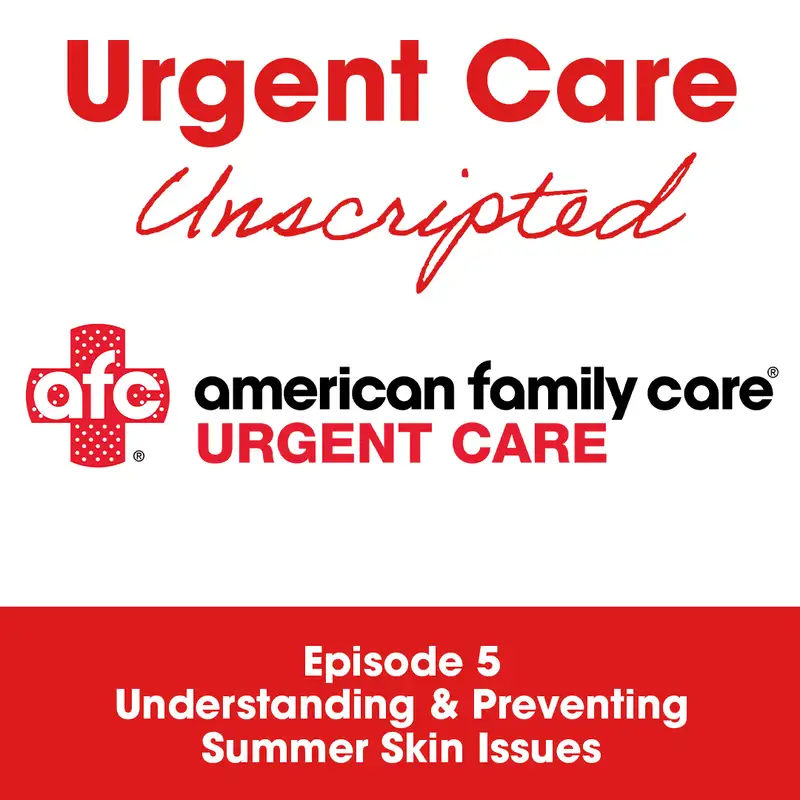Urgent Care Unscripted: Ep. 5 - Understanding & Preventing Summer Skin Issues
Welcome back to Urgent Care Unscripted.
My name is Barbara run, alter.
I'm the director of operations
and business development for AFC
Urgent Care in West Haven.
And this is Mohammad Salman.
The franchise in honor
of is here with Dave and,
No.
it's seven now.
It's hot.
And, also prime time for all kinds of,
rashes and bug bites and, heat.
And sunburns
that make you flex in your life choices.
Yeah.
And, today, I thought it'd be a good idea
to ask Google
what are the most, asked
questions regarding summer skin scaries.
I guess I was going to call this one.
So thank you so much for your feelings
for joining us.
Our medical director
and veteran er, physician.
Thank you for having me.
Lovely.
I know you love that.
I don't care.
Can you tell us, like,
this seems small,
but they cause a lot of anxiety,
especially with the concerns
about Lyme disease.
If you can elaborate, like how did it
happen and what was it there?
All right, so, in general, the politics
carry infections and can, you know,
infect people once they bite them.
That, Lyme disease is a big
one of the other
diseases
to take into consideration as well.
Obesity is,
Rocky Mountains fight fever, some
which are not necessarily in the
northeast, but these are considered,
that a tick bite once it occurs.
If it's attached long enough to then
transmit these antigens into the body
and in, a person can get sick from it
can then get
is known for Lyme disease.
And it was discovered in Connecticut.
So hence the name line. Right.
And the problems that can occur
is that the disease can affect
the actually the heart
joints, the nervous system.
So depending on severity,
the illness depends on the manifestations.
And sometimes
it can be difficult to treat.
So that's the big concern.
You know, you don't want to get them
by taking have it untreated
and potentially suffer
the consequences of the disease.
Yes. What questions like,
where does that come from most frequently,
like I heard a lot of times from animals
like deer and so forth.
It's actually probably more rodents that,
they actually carry it.
And, but winds up
happening is during their life cycle,
they, try to attach
to animals, mammals primarily.
And they say at the end of
grass, whatever,
with their, like, claws out,
ready to latch onto something.
So then, you know,
when you out in the woods hiking,
obviously
you should wear insect repellent.
So we're likely to see some dark
be identifying thing
that may be crawling on you and always do
a, tick check after kind of hikes.
Also keep in mind pets can also carry them
and bring them into the home,
especially if you live in a wooded area
and they come back inside
and you know, provide you with,
unwanted guests in the home.
So just keep that, be mindful of that.
But once they attach, right,
then they, they bite into the skin,
they feed on you
and they transmit their pathogens.
So how does a person know that that person
was not bitten by a mosquito?
Or, and but was bitten by a tick?
What's the symptom of,
you know, tick, attach?
They stay on the skin
as opposed to a mosquito bite.
That lovely little bug
takes the blood and goes away right.
Ticks actually stay on board.
Ticks don't jump.
They crawl. Right.
The way to get to touch is,
as I described earlier,
they say on the end of plants waiting for
somebody to come by and grab on.
So once they get on that,
they stay attached.
And usually we find something
attached to your skin.
Sometimes you can venom bite
and not realize that they have been there
and done unnoticed,
depending on the part of body.
And then you may have, you know, symptoms
that manifest, you know, days, weeks
or even months later, so quickly
before we move on to the next, skin.
Scary.
What should a patient do if they realized
that they got bit by a tick?
What the challenge would do
in terms of lactic acid biotics,
just because of the strong
likelihood of a tick borne illness.
If you don't have any symptoms
and you then realize you forget,
you could always get tested for later,
if you develop symptoms,
some sounds kind of difficult
from the survivor perspective,
because they may come in with things
that sound like aches and pains that,
you know, it doesn't get those, you know.
Yeah.
That if associated
with some other concern features, then,
you know, maybe, a tick borne illness,
we consider that testing would be done.
Yeah.
So it can sometimes be a little bit
of a diagnostic dilemma.
So from a provider's perspective,
if you give it by a tick it's always best
to just get come in and get diagnosed.
You would had a diagnosis. You.
Right away to the disease
a prophylactic site.
Sorry.
Yes. In order to potentially prevent
the onset of symptoms.
Got it.
Our next topic is going to be poison ivy.
So that's a good one.
It's that time of the year
where people are working in their yard.
So just quickly go through
from a provider's perspective,
what should a patient do and when should
they come to the urgent care?
Avoid them.
Tell my husband that please.
That said, is, you know, oftentimes,
we have a large amount in the area
or an unidentified and you came across,
the poison ivy, poison oak, Sumatra,
or the oils in the plant
that actually caused this reaction.
Not everyone is allergic to it.
And there are a lot of people that are,
and with it,
it can be, very uncomfortable
to have this rash,
you know, depending on the severity
will depend on what kind of treatment.
Sometimes, you may need, prescription
medication, steroids to combat the,
the inflammatory
response, the immune response to the oil.
But then other, like,
basic things to do are, taking the clothes
and washing them,
you know, get those out.
Yeah, those are big ones,
but it can spread if somebody touches,
so the oil,
if it's still present, like,
that's what you have to wash the clothes.
It can contaminate
other parts of the body.
So even if you no longer by the plants,
but you have contaminated clothing.
Yeah.
Then you can actually, we, you know, touch
anything else with it, and you get that,
kind of like, sanitize once
it has happened. Yes.
And then sanitize all your clothes
that you've been wearing and,
bed sheets and stuff
so that you are not causing more trouble
to yourself or, or others
who might get in touch.
Yeah.
I mean, the theme.
Oh, please, I know.
So is that the kind of reaction it is?
You often wouldn't get it
the first time is the repeated exposure.
That's
when your immune system gets primed to it.
Yeah.
So, either way, avoiding the oils
which come with the plant, I'm unsure
how they're handling bedding, but.
Interesting.
Maybe somebody doesn't like you and.
Oh, I don't give any ideas.
Please.
That's okay.
Let's, Definitely.
So one of the other skin
scary is, is sunburn.
So let's talk a little bit about that.
When or I know sunburns can be very mild,
but they can also be very severe.
So at what point should a patient
say I think I need to do something
about this sunburn.
A blistering
would be a concern for like, deeper burn.
Most sunburns are going to be,
superficial, uncomfortable.
For those that care about you,
for your appearance, you know,
and and having a high SPF
will be, paramount
to reducing the amount of wrinkles
you have.
So that's one thing.
But besides that, you know, the
amount of pain can be very comfortable.
And the location, right,
if you have something on
your forearm is probably not as bad.
You have something in your back,
you know, you went and laid on the beach
with, exposure to,
the sun in the Caribbean.
And, I'm expecting it to be similar
kind of exposure
as someone somewhere in the northeast.
You probably going to have,
most of your burden at that point.
And wearing clothing on top of somebody's
skin can be very uncomfortable.
So something you can do is, you know,
provide, you know, medications for pain
relief, you know, and give suggestions
in terms of, like, local care.
Gotcha.
Regiment, like, okay,
if I'm starting for the day
and I had the beads for the whole day,
do I just put it on once a day
or in the morning and be done with it,
or is there like a frequency
or you depending upon the heat
and whatnot?
Yeah.
You will need some other sunscreen
so that.
What's up for you?
You think about 20 minutes
before going outside to settle
and then if you're going to be outside,
you need to reapply,
especially if you're going to be in water,
you know, things get washed off.
And also realize
that when you're in the water,
you actually get exposed to the sun
as well.
So, a long time in water is likely going
to give you a sunburn as well.
Okay.
However, you don't feel hot water
the water, you are getting sunburn.
So, because of the applications,
the timing of which I'm not sure, but
definitely if you're getting into water.
All right, so
to summarize, tick bites,
poison ivy, and sunburns can be minor,
but can also be, turned into major
really quickly.
And that's where we come in
as an urgent care, and that's where we can
come in and help treat you fast,
affordable and no appointment necessary.
Which is the best part?
Actually, one thing I did want to add is,
you know, he strokes, heat exhaustion,
other things to consider,
you know, you want to,
try to stay cool in warm weather,
you know, being
some of the summer months of the year,
and you always want to maintain hydration.
If you find yourself getting, like,
being in a hot environment, not sweating,
that's always a bad sign.
Confusion. Always a bad sign.
You sort to get confused.
You're feeling like your brain
is actually getting a little bit too hot.
So those are some emergencies,
and a lot of prevention will help.
You know, be mindful of that basically.
That's great.
Thank you so much for listening today
to Urgent Care Unscripted.
And you can find us at 354
Sawmill Road in West Haven.
And, enjoy. I'll be safe.
And when you need, contact us.
That is your generous haven.
We welcome you to.
And thank you for watching our episodes.
And I think, Barbara and Doctor Pacheco
for joining us today.
Thank you. My.
Creators and Guests




